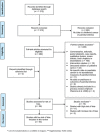A systematic review on factors and consequences of parental distress as related to childhood cancer
- PMID: 26354003
- PMCID: PMC5049674
- DOI: 10.1111/ecc.12361
A systematic review on factors and consequences of parental distress as related to childhood cancer
Abstract
The literature including correlates of parental distress as related to childhood cancer is abundant. It is important to identify predictive factors and outcomes of this distress in parents. The objective of this review was to update previous syntheses on factors of distress and to identify outcomes of parents' distress in the recent literature (2007-2012). We performed a systematic review to identify all quantitative studies including measures of parental distress and associated factors during the study period. We found 56 eligible studies, of which 43 had a Low risk of bias (Cochrane guidelines). Forty-two reports included potential predictive factors. Significant relationships were found with clinical history of the child, sex of the parent, coping response and personal resources, pre-diagnosis family functioning, but not education/income or marital status. Twenty-five reports studied potential consequences of distress and focused on psychological adjustment in parents and children. Compared to past periods, a higher proportion of studies included fathers. Measures used to evaluate distress were also more homogeneous in certain domains of distress. This review underscores the need for appropriate methods for selecting participants and reporting results in future studies. Appropriate methods should be used to demonstrate causality between factors/consequences and distress.
Keywords: cancer; emotional; families; psychological; quality of life.
© 2015 The Authors. European Journal of Cancer Care Published by John Wiley & Sons Ltd.
Figures
References
-
- Accreditation Canada . 2013. Cancer Care and Oncology Services [Online]. Available at: http://www.accreditation.ca/accreditation-programs/qmentum/standards/can... (accessed April 27, 2013).
-
- Barrera M., Atenafu E., Andrews G.S. & Saunders F. (2008) Factors related to changes in cognitive, educational and visual motor integration in children who undergo hematopoietic stem cell transplant. Journal of Pediatric Psychology 33, 536–546. - PubMed
-
- Barrera M., Atenafu E. & Pinto J. (2009) Behavioral, social, and educational outcomes after pediatric stem cell transplantation and related factors. Cancer 115, 880–889. - PubMed
-
- Barrera M., Atenafu E., Doyle J., Berlin‐Romalis D. & Hancock K. (2012) Differences in mothers’ and fathers’ health‐related quality of life after pediatric SCT: a longitudinal study. Bone Marrow Transplantation 47, 855–859. - PubMed
-
- Barrera M., Hancock K., Rokeach A., Cataudella D., Atenafu E., Johnston D., Punnett A., Nathan P.C., Bartels U., Silva M., Cassidy M., Jansen P., Shama W. & Greenberg C. (2014) External validity and reliability of the psychosocial assessment tool (PAT) among Canadian parents of children newly diagnosed with cancer. Pediatric Blood and Cancer 61, 165–170. - PubMed
Publication types
MeSH terms
LinkOut - more resources
Full Text Sources
Other Literature Sources
Medical
Miscellaneous


